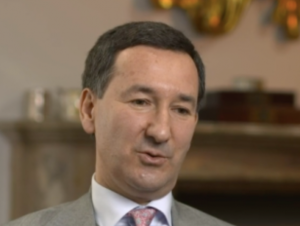MUSEUM OF ITALIAN JUDAISM AND THE SHOAH – “We must continue to cultivate culture”
 A well-known entrepreneur in the oil industry, Guido Ottolenghi served as president of the Jewish community of Bologna from 2005 to 2013. Since 2014, he has been the head of the local Jewish Museum, which, with its numerous annual meetings and events, is one of the most active museums in the country. “I am honoured and grateful to those who came before me for their important work. I strongly believe in the role of culture as the science of coexistence and as a place where the most significant interactions of a society are built. I hope to be as good as those who came before me,” said Ottolenghi on the eve of his appointment. Discussing programs and general work settings would be premature, explained the new president of the Museum of Italian Judaism and the Shoah (MEIS), “but fortunately, the museum is a well-functioning machine: I will be in touch with its director Amedeo Spagnoletto, a person I respect, to better understand and orient myself.”
A well-known entrepreneur in the oil industry, Guido Ottolenghi served as president of the Jewish community of Bologna from 2005 to 2013. Since 2014, he has been the head of the local Jewish Museum, which, with its numerous annual meetings and events, is one of the most active museums in the country. “I am honoured and grateful to those who came before me for their important work. I strongly believe in the role of culture as the science of coexistence and as a place where the most significant interactions of a society are built. I hope to be as good as those who came before me,” said Ottolenghi on the eve of his appointment. Discussing programs and general work settings would be premature, explained the new president of the Museum of Italian Judaism and the Shoah (MEIS), “but fortunately, the museum is a well-functioning machine: I will be in touch with its director Amedeo Spagnoletto, a person I respect, to better understand and orient myself.”
Ottolenghi will still bring his vision to MEIS, which he summarizes as following: “Cultivate culture, on one hand by defending some key principles with calm firmness, and on the other by constantly being open to debate and new ideas. To do so we should be inspired by what the masters of the Mishna did.”
The same spirit, he said, “has permeated the work done at the Jewish Museum of Bologna, allowing a serene debate on every topic.” For now, Ottolenghi will not resign from his position in Bologna, “avoiding overlaps, but creating connections where useful.”
Together with his father Emilio z.l. and Tito Menzani, Ottolenghi is the author of the book Il merito dei padri. Storia de La Petrolifera Italo Rumena 1920-2020 (The Merit of Our Fathers: The History of La Petrolifera Italo Rumena 1920-2020) published by Il Mulino. On the hundredth anniversary of the family business, Italian president Sergio Mattarella awarded him the title of Cavaliere del Lavoro (Knight of Labor is a high honor awarded to individuals who have demonstrated exceptional merit in their professional lives, particularly in business and industry).
He commented at the time that it was “the greatest recognition in a century of activity. A recognition I want to ideally share withthose in previous generations who made this story possible, even facing extreme challenges such as the fascist racial laws, war and persecution.” Speaking at a conference on the current state of antisemitism held in January in the communal library of the Archigymnasium, Ottolenghi raised concerns about the opening of a new “Pandora’s box” of hatred and prejudices. To counter this trend, he reaffirms today, “it is most necessary to invest on culture.”
a.s.
Translated by Chiara Tona, student at the Advanced School for Interpreters and Translators of the University of Trieste, trainee in the newsroom of the Union of the Italian Jewish Communities – Pagine Ebraiche.
